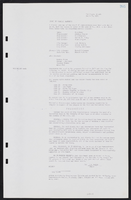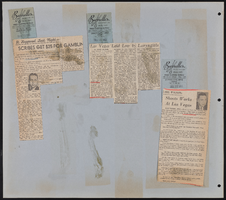Search the Special Collections and Archives Portal
Search Results
News segment about the gaming industry as it relates to the economy: video
Date
Archival Collection
Description
Local news anchors discuss the gaming industry as a growth area in the stock market; includes interview clips with Stephen Bollenbach of Hilton Hotels, Charles Mathewson, and Morris Symson. Original media VHS, color, aspect ratio 4 x 3, frame size 720 x 486. From the Bob Stupak Professional Papers (MS-01016) -- Professional papers -- Audiovisual material -- Digitized audiovisual clips file.
Moving Image
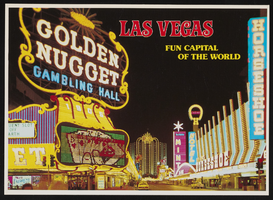
Fremont Street, image 007: postcard
Date
Archival Collection
Description
Image
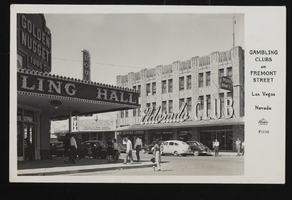
Eldorado Club and Golden Nugget on Fremont Street in Las Vegas, Nevada: postcard
Date
Archival Collection
Description
Image
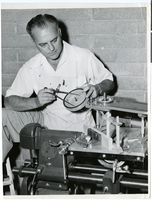
Photograph of Wilbur Clark working on a scale model of a roulette table, Las Vegas, Nevada, circa 1944-1950s
Date
Archival Collection
Description
Image
UNLV Libraries Collection of International Lottery & Totalizator Systems, Inc. Financial Reports and Press Materials
Identifier
Abstract
The UNLV Libraries Collection of International Lottery & Totalizator Systems, Inc. Financial Reports and Press Materials contains financial reports, press kits, press releases, and a newspaper clipping for International Lottery & Totalizator Systems Inc. in Vista, California. The records date from 1992 to 1993.
Archival Collection

Transcript of interview with J.W. Campbell by Raymond Haft, February 19, 1979
Date
Description
On February 19, 1979, Raymond Haft interviewed his friend, J. W. Campbell (born June 13, 1918 in Pioche, Nevada). This interview covers the history of Nevada, including Mr. Campbell’s personal history and the growth of Nevada, overall. Mr. Campbell discusses the Stewart Ranch, the Mormon Fort, swimming pools in Las Vegas, and the above ground atomic tests. He also recalls the crash of Carole Lombard’s plane and the building of the Basic Magnesium Plant in Henderson. Mr. Campbell calls Las Vegas a “One industry town,” stating that gambling (and tourism) are the main and major factors in Las Vegas, Nevada.
Text

